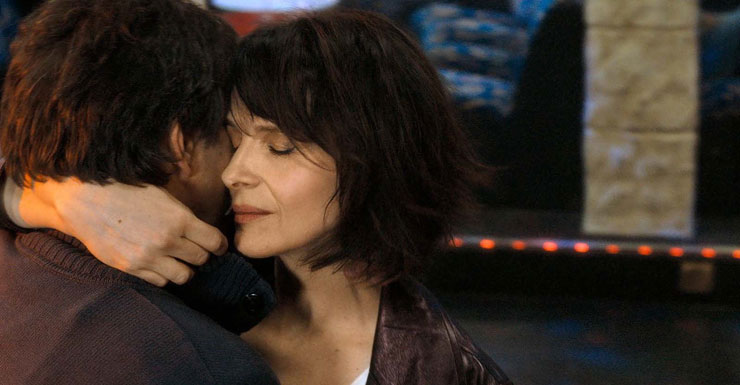
Juliette Binoche.
Cinema can provide an escape from our daily travails. We take on other people's crises, obstacles and setbacks, and those hours spent in a darkened theater (or before the glare of a television or laptop screen) provide a temporary reprieve from our own troubles. But when a movie comes along like “Let the Sunshine In,” the distinction between our dilemmas and those being faced onscreen is eroded down to a wafer-thin line.
Did I mention this acutely observed character study is being billed as a romantic comedy?
But this is a rom-com (of sorts) by French filmmaker Claire Denis, the prolific auteur behind “Beau travail” and “White Material,” among many other accomplished meditations on identity and the quest for self-realization. She's not exactly known for her light touch, but she gives it a go here, and the results are engaging and, on occasion, quite enchanting. It might appear like a rather minor work on the outside, but the façade is a front for a meaty dissection of the search for romantic fulfillment. It becomes clear the eclectic filmmaker ought to let her hair down more often.
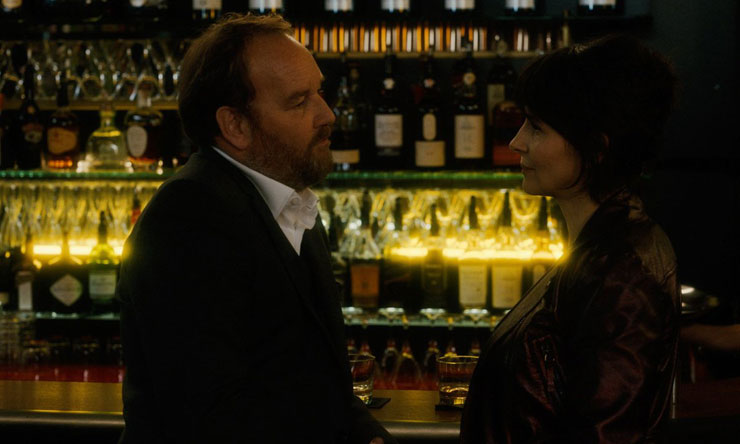
Xavier Beauvois, Juliette Binoche.
When you have Juliette Binoche as your star, though, the battle to earn the viewer's empathy is already halfway won. Rather than coast on her luminous star quality, the Oscar winner rolls up her sleeves and acclimates herself to Denis' sensuous rhythms, which, to admirers of the filmmaker's work, feel as pleasurable as putting on a favorite shirt.
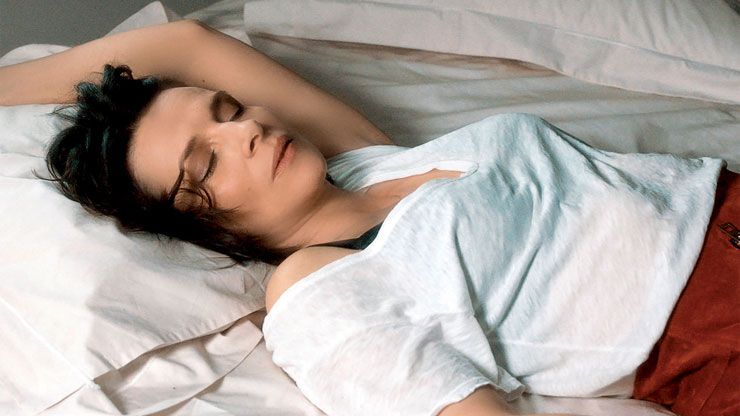
Juliette Binoche.
Denis shows little interest in following the genre's mold, which usually begins with a “meet cute” between prospective romantic leads, followed by a courtship. “Let the Sunshine In” does away with these formalities. It begins in the middle of lovemaking, though I would use that term loosely, as Isabelle (Binoche) lies beneath a bearded, stocky man and attempts to enjoy herself. But really, who is she kidding?
As is the custom in European cinema, it takes some time to establish who's who. Isabelle is a well-regarded painter, and her balding lover, Vincent (Xavier Beauvois) is a wealthy banker with a rather large, um, ego and a complicated personal life. To say he's difficult to deal with is putting it mildly, as evidenced in a scene set in a bar where Isabelle looks on in dismay as Vincent barks emasculating orders at a bartender while simultaneously having a snippy conversation with her.
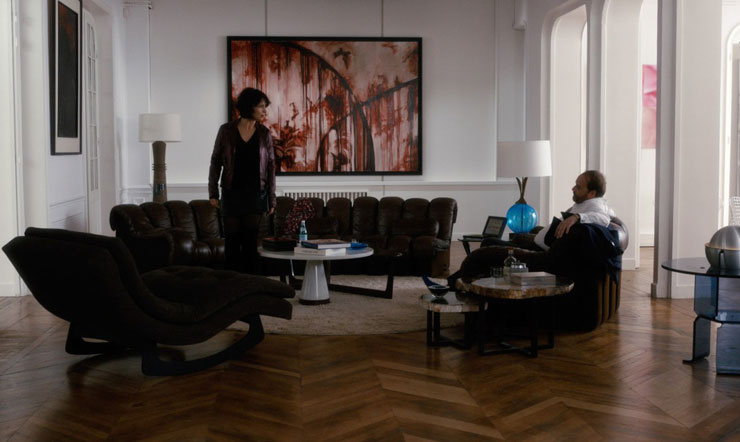
Juliette Binoche, Xavier Beauvois.
There's a lot of gab in “Let the Sunshine In,” which was inspired by semiotician Roland Barthes' essay, but the sophisticated banter never becomes stuffy, thanks to Denis' eye and knack for camera placement. (Those are some dreamy close-ups of Binoche that cinematographer Agnès Godard has lensed.) The dialogue, penned by Denis and Christine Angot, is a jumping-off point, not a rigid text the actors recite, and that approach prevents the film from becoming dry or inaccessible. Denis works on instinct, so we don't get stuck in the characters' heads.
Vincent, as it turns out, is one of a handful of men Isabelle, an ageless beauty in her early 50s, pursues in the course of the film. Most notably is a younger, unnamed stage actor (Nicolas Duvauchelle) with whom she feels an instant connection, even though he remains ambivalent about his own feelings for her. In a scene where Isabelle tries to talk her reticent date into coming upstairs with her, Denis keeps cutting back to Isabelle's hand on the car handle, a simple yet efficient reminder of the fragility of these encounters. In the film's most effective edit, a night out on the town between the pair appears to ends well, but Denis abruptly cuts to a day-after rude awakening: a shot of the actor in a café, expressing his regret for the intimacy Isabelle enjoyed so much. “This isn't a love thing,” he tells her more than once.
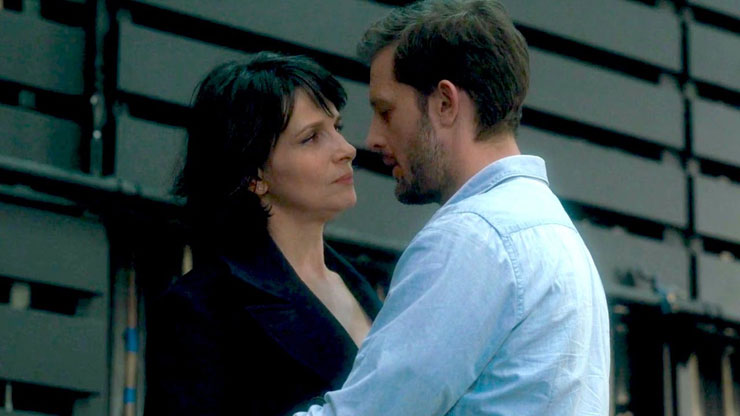
Juliette Binoche, Nicolas Duvauchelle.
Cue the painting therapy. Denis' protagonist is only seen with a paintbrush in one scene, the artist's broad canvas a stark contrast to the film's more compact scope. But her work, and the art world circles she moves around in, linger conspicuously in Denis' peripheral vision. More central to the filmmaker's interests is showing how Isabelle latches on to prospective suitors. The actress is unafraid to make her character come across as needy and clingy, even if that means risking the viewer's investment. (The wardrobe helps; fashionistas will likely approve of the character's purple and red jackets, as well as an elegant green scarf.)
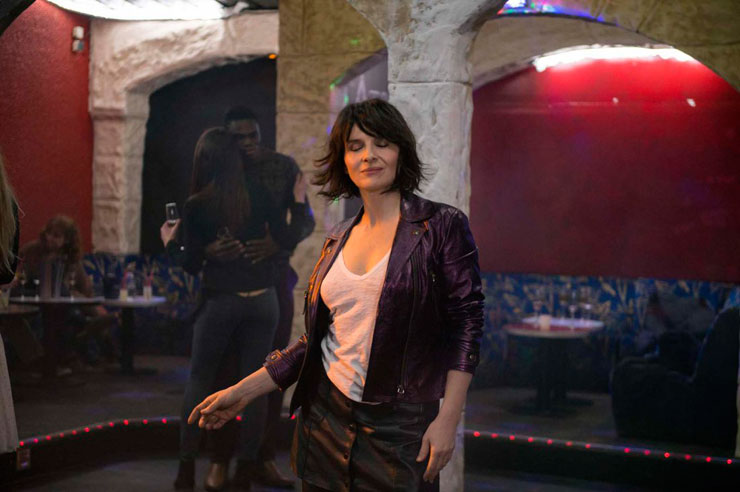
Juliette Binoche.
That tactic pays off handsomely. By showing all of her characters' vulnerabilities and neuroses in such unvarnished light, Denis evens the playing field. She refuses to vilify those who would underappreciate or mistreat Isabelle, and thus Isabelle's romantic forays bear the ring of truth, regardless of how short-lived they may be or how insignificant they might appear. The filmmaker takes on toxic masculinity from a seasoned vantage point, preventing the arguments from coming across as shallow or one-sided. The movie ends with what appears to be session between Isabelle and a psychic that feels like a 1990s throwback because of the iconic actor who plays her love guru; I wouldn't dream of spoiling the 11th-hour surprise.
The film's title is a reference to inner peace; the French title, “Un beau soleil intérieur,” more accurately conveys Isabelle's indefatigable efforts to reach that light that makes her feel whole yet continues to elude her. Dating might often be an exercise in futility, a series of dead ends that make you want to throw in the towel. But even when we seem to have found a “match,” Denis says, it is never a destination. That finality, regardless of how tangible it might appear, is a mirage. The search for love is an eternal question, not an answer.
Ah, but the key to make it all worthwhile is to enjoy those little victories, those instances where, in the words of novelist Terry McMillan, you can finally exhale. Few films have captured this sense of release like a scene in “Let the Sunshine In” that shows Isabelle dancing by herself before being approached by a mystery man. They begin to sway together in time with the music, and your heart smiles. It's an intoxicating moment that, like so many things in “Let the Sunshine In,” feels just right.
“Let the Sunshine In” starts Friday, May 11, at the Coral Gables Art Cinema. It opens the following Friday at the Classic Gateway Theatre in Fort Lauderdale.
 MAIN MENU
MAIN MENU

